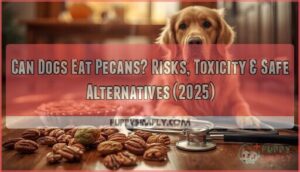This site is supported by our readers. We may earn a commission, at no cost to you, if you purchase through links.
Last Thanksgiving, a veterinary emergency room in Texas treated twelve dogs for pecan toxicity—all within a 48-hour period. The culprit wasn’t intentional feeding but fallen nuts from backyard trees and holiday baking mishaps.
While pecans might seem like a harmless snack, they pose serious risks to dogs, from pancreatitis triggered by their high fat content to neurological damage caused by mold-produced mycotoxins. The danger intensifies because symptoms don’t always appear immediately, and what looks like a fresh pecan could harbor invisible toxins.
Understanding why pecans don’t belong in your dog’s diet, recognizing the warning signs of poisoning, and knowing which alternatives keep tails wagging safely can prevent a holiday treat from becoming a medical emergency.
Table Of Contents
- Key Takeaways
- Can Dogs Eat Pecans?
- Health Risks of Dogs Eating Pecans
- Pecan Toxicity and Mycotoxin Dangers
- Symptoms of Pecan Poisoning in Dogs
- What to Do if Your Dog Eats Pecans
- Preventing Pecan Ingestion by Dogs
- Safe Nut and Treat Alternatives for Dogs
- Long-Term Effects of Pecan Consumption
- Nutritional Considerations for Dog Treats
- Frequently Asked Questions (FAQs)
- Can dogs eat pecans?
- What are the symptoms if a dog eats pecans?
- What are the benefits of eating pecans?
- Can dogs eat pecans & walnuts?
- What happens if my dog eats pecans?
- How many pecans are too many for a dog?
- Which nuts are poisonous to dogs?
- Can dogs have almonds or pecans?
- How long does pecan poisoning take to show symptoms?
- Can dogs eat pecan pie or baked goods?
- Conclusion
Key Takeaways
- Pecans aren’t safe for dogs because they contain juglone—a toxic compound that triggers gastrointestinal and neurological problems—and there’s no established safe amount since toxin levels and mold contamination vary wildly from nut to nut.
- The high fat content in pecans (about 72 grams per 100 grams) can trigger pancreatitis in dogs, causing vomiting, abdominal pain, and potentially life-threatening illness, especially with repeated exposure or in dogs with pre-existing conditions.
- Moldy or improperly stored pecans pose serious mycotoxin dangers, producing tremorgenic toxins and aflatoxins that cause muscle tremors, seizures, rapid liver damage, and neurological effects that can appear within 1-2 hours of ingestion.
- If your dog eats pecans, contact your veterinarian immediately and monitor for symptoms like vomiting, diarrhea, lethargy, tremors, or seizures—early intervention is critical since symptoms don’t always appear right away and can rapidly progress without professional treatment.
Can Dogs Eat Pecans?
Why would you risk your dog’s health over a snack that’s on almost every veterinarian’s “avoid” list? Pecans aren’t safe for dogs. Unlike some other nuts, pecans contain juglone—a toxic compound that triggers gastrointestinal and neurological problems in dogs. Most veterinary and pet organizations recommend complete avoidance, not just moderation.
Pecans aren’t safe for dogs—they contain juglone, a toxic compound that triggers gastrointestinal and neurological problems
There’s no established “safe” amount because the toxin levels and mold contamination vary wildly from nut to nut, making every pecan a gamble. Even breed sensitivities don’t matter here; all dogs are at risk. Whether you’re dealing with raw, roasted, or prepared pecans, the danger remains. Commercial and veterinary advisories consistently warn against offering pecans as treats.
If your dog snatches one, contact your veterinarian immediately—pecan poisoning isn’t something to wait out at home. It’s important to understand the potential hazards for dogs associated with pecan consumption.
Health Risks of Dogs Eating Pecans
While pecans aren’t technically toxic, they can still cause serious problems for your dog. The risks range from mild stomach upset to life-threatening emergencies, depending on how much your dog eats and the condition of the nuts.
Let’s look at the three main health concerns you need to know about.
High Fat Content and Pancreatitis
Pecans pack about 72 grams of fat per 100 grams—a heavy load that can trigger pancreatitis in your dog. Here’s why high fat content levels matter:
- Pancreatitis triggers: Diets above 20% fat put dogs at risk, causing vomiting, abdominal pain, and systemic illness.
- Digestive upset: Even small amounts can spark diarrhea and lethargy.
- Recurrent exposure: Repeated high-fat treats may lead to chronic pancreatic problems. Pecans also contain juglone, which can lead to nut toxicity symptoms.
Choking and Digestive Obstruction
Beyond digestive upset, whole pecans pose serious mechanical risks. Their size can cause esophageal blockage, especially in smaller breeds, creating a choking hazard that demands immediate surgical intervention.
If swallowed, shells and large fragments can trigger intestinal blockages—sometimes leading to intestinal perforation, peritonitis, and life-threatening sepsis. Breed vulnerability matters: tiny dogs face disproportionate danger from even a single nut causing gastrointestinal blockage.
Allergic Reactions in Dogs
While less common than digestive issues, tree nut allergens in pecans can trigger IgE-mediated responses in susceptible dogs—much like human nut allergies. Watch for facial swelling, hives, red eyes, or itchy skin developing within hours of ingestion.
One documented case showed acute vomiting and widespread skin reactions after nut exposure.
Allergy management requires strict avoidance and, when symptoms appear, prompt veterinary treatment with antihistamines or corticosteroids.
Pecan Toxicity and Mycotoxin Dangers
While pecans themselves aren’t technically toxic, the real danger lies in what grows on them when they’re past their prime. Moldy or improperly stored pecans can harbor dangerous mycotoxins that pose serious health risks to your dog.
Let’s look at the specific toxins you need to watch out for and how they can affect your pet.
Moldy Pecans and Tremorgenic Mycotoxins
Did you know that moldy pecans can pack a toxic punch for your dog? Mycotoxin sources like Penicillium molds produce tremorgenic mycotoxins, which trigger neurological effects—muscle tremors, seizures, and even collapse.
Toxic doses vary, so even a small amount poses risks. Diagnostic tests confirm exposure, and swift treatment outcomes depend on early intervention. Moldy pecans aren’t worth the gamble.
Aflatoxin Poisoning Risks
Regarding aflatoxin sources, moldy pecans top the list of risks for your dog. These toxic mycotoxins can cause rapid liver damage—even before you spot symptoms. Chronic exposure is tricky, since diagnostic challenges mean you might miss early signs. Regulatory limits exist, but invisible toxic mold can slip through, putting your dog’s health in real jeopardy.
- Rapid liver injury often occurs unseen
- Chronic exposure leads to long-term harm
- Regulatory limits may not catch every risk
Neurological Effects of Mycotoxins
When tremorgenic mycotoxins from toxic mold hit your dog’s nervous system, tremor mechanisms kick in fast—causing muscle shakes, ataxia, and distinct seizure types. Diagnosis challenges arise because signs mimic other conditions.
Meanwhile, aflatoxins trigger liver encephalopathy, compounding neurological effects in dogs. Chronic effects may linger for days, making the risks of mycotoxins from moldy pecans genuinely dangerous and unpredictable.
Symptoms of Pecan Poisoning in Dogs
If your dog gets into pecans, knowing what to watch for can make all the difference. Symptoms can range from mild stomach upset to serious neurological issues, depending on how much they ate and whether the nuts were moldy.
Here’s what you need to keep an eye out for.
Vomiting and Diarrhea
Vomiting and diarrhea are often the first symptoms you’ll notice if your dog eats pecans, signaling acute gastrointestinal upset. These digestive issues arise from the high fat content and potential mold contamination, with severity ranging from mild discomfort to dangerous dehydration.
Watch for these warning signs:
- Repeated vomiting within hours of ingestion
- Watery or bloody diarrhea indicating severity
- Excessive drooling preceding stomach distress
Early treatment and prevention of dehydration are vital.
Loss of Appetite and Lethargy
When your dog suddenly turns down their favorite meal or spends the day curled up instead of greeting you at the door, these red flags often point to pecan poisoning’s systemic impact.
Reduced energy and disrupted eating habits signal underlying causes like gastrointestinal distress or toxin absorption affecting multiple organ systems.
These symptoms warrant immediate veterinary assessment, as lethargy combined with appetite loss can indicate worsening toxicity requiring professional veterinary care.
Seizures and Muscle Tremors
Neurological symptoms like seizures and tremors are the most alarming signs of mycotoxin exposure from moldy pecans. You might notice involuntary muscle twitching, loss of coordination, or full-body convulsions starting within 1–2 hours of ingestion.
These tremor types signal immediate neurological damage requiring urgent veterinary care, as seizure severity can rapidly progress from mild fasciculations to life-threatening episodes without prompt professional treatment.
What to Do if Your Dog Eats Pecans
If your dog gets into pecans, your first move matters. What you do in those early moments depends on how much they ate, whether the nuts were moldy, and what symptoms show up.
Let’s walk through the immediate steps, when to call your vet, and whether you can handle things at home or need professional help.
Symptom Monitoring and Immediate Actions
If you notice vomiting, diarrhea, lethargy, abdominal pain, or early neurological signs like tremors, start tracking symptoms right away. Keep your dog calm in a quiet spot for at-home stabilization, and remove any leftover pecans.
Remember, decontamination limits mean you shouldn’t induce vomiting without veterinary guidance. Careful early symptom tracking helps make sure you catch worsening signs before they escalate.
When to Contact a Veterinarian
If symptoms persist or worsen, don’t wait—veterinary care becomes your best next step. Severe symptoms, especially after moldy pecans or in small breeds, demand prompt attention. You should call your veterinarian if you notice:
- Signs of distress in dogs
- Pre-existing conditions
- Unknown ingestion amount
- Blood in stool or vomit
- Sudden neurological changes
Act quickly to limit pecan poisoning risks.
Home Care Vs. Professional Treatment
Once you’ve called your vet, they’ll help you decide between home monitoring and clinic care. Mild cases with a single vomit or soft stool can often be watched at home for 24–48 hours, tracking gum color and appetite. If tremors, repeated vomiting, or diarrhea appear, professional treatment with activated charcoal, decontamination, and extended monitoring duration ensures better outcome prognosis for pecan poisoning.
| Home Monitoring | Clinic Indications |
|---|---|
| Single vomit or mild diarrhea | Tremors or seizures |
| Alert, eating normally | Profuse vomiting/diarrhea |
| No neurologic signs | Neurologic symptoms present |
Preventing Pecan Ingestion by Dogs
The best way to protect your dog from pecan-related health issues is to prevent access in the first place. A few simple changes around your home can make a big difference in keeping curious noses away from these risky nuts.
Here’s what you need to focus on to create a safer environment for your pet.
Secure Storage of Pecans
Think of proper storage as your first line of defense—it’s about making pecans impossible for your dog to reach. Use airtight containers made from durable, BPA-free materials and store them in secure locations like locked cabinets.
Pet-proof containers with reinforced lids block persistent pets completely. Choose capacity based on your needs, but prioritize containers that prevent dog access through childproofing methods and elevated placement.
Cleaning Up Food Spills
When pecans hit the floor, immediate cleanup becomes your best tool for pet safety. Quick action prevents your dog from encountering choking hazards or toxic foods like moldy nuts.
- Remove your dog from the area using barriers or the “leave it” command
- Vacuum hard floors first to collect loose pecan pieces quickly
- Scrub surfaces with warm water at 110°F to eliminate residual oils
- Apply safe disinfectants like diluted bleach solution for thorough cleaning
- Monitor symptoms for 24-48 hours, watching for vomiting or lethargy
Preventative feeders with catch pans help contain future spills.
Educating Family and Guests
Beyond cleanup, guest briefings safeguard your dog from pecan poisoning during gatherings. Inform visitors about toxic foods before they arrive—holiday periods see 53% more poisoning cases.
Post visible reminders near snack areas, train your dog with the “leave it” command, and guarantee secure storage of pecans.
Following vet advice, educate all household members on pet safety, as 29% unknowingly feed dogs harmful nuts.
Safe Nut and Treat Alternatives for Dogs
If pecans are off the table, you might wonder what treats you can safely share with your dog.
The good news is that several nuts and other snacks won’t put your pet at risk when offered in moderation.
Let’s look at some safer options that can satisfy your dog’s taste buds without the worry.
Peanuts, Cashews, and Almonds
While pecans are risky, you might wonder about other nuts. Peanuts, cashews, and almonds can be safe treats for dogs—but only in careful doses.
Offer a few unsalted, roasted pieces to avoid peanut allergies or cashew toxicity issues. Almonds pose digestion challenges and choking risks, so skip them entirely.
Safe portions matter: limit healthy treats to prevent weight gain while keeping nutrition balanced.
Nut Butters Without Xylitol
Peanut butter can be a healthy treat for your dog—if you choose xylitol-free brands. This artificial sweetener causes severe poisoning, so ingredient sourcing matters.
Safe Brands and Portion Control tips:
- Natural options like 365 Organic Unsweetened or Crazy Richard’s contain only peanuts
- Small dogs get ¼ teaspoon; large breeds max out at 1 tablespoon daily
- Almond butter offers vitamin E but needs moderation due to fat content
- Always check labels—some “natural” brands sneak in corn syrup
- DIY recipes using plain peanuts eliminate allergy concerns entirely
Healthy Non-Nut Treat Options
Your dog doesn’t need nuts to enjoy satisfying snacks. Vegetable-based treats like raw carrots and green beans deliver fiber and vitamins at roughly 31–41 kilocalories per 100 grams, making them excellent safe snacks for calorie management.
Fruit-based treats such as apple slices or blueberries offer antioxidants, while protein-based treats like plain cooked egg whites provide lean nutrition.
Commercial formulations with sweet potato or pumpkin give you convenient, healthy treat options that support your dog’s wellbeing.
Long-Term Effects of Pecan Consumption
While a single incident with pecans mightn’t seem like a big deal, repeated exposure or a serious poisoning episode can leave lasting marks on your dog’s health. The effects don’t always disappear once the immediate symptoms clear up.
Let’s look at three key areas where pecan consumption can create ongoing problems for your dog.
Chronic Gastrointestinal Issues
High-fat pecans don’t just cause one-time stomach troubles—they can set the stage for lasting gastrointestinal problems in dogs. Repeated exposure leads to persistent digestive upset, recurrent vomiting patterns, and ongoing abdominal pain that disrupts your dog’s gut function. In severe cases, you’re looking at potential intestinal blockage from repeated fatty food consumption.
- Chronic digestive issues manifest as recurring vomiting and diarrhea
- Persistent abdominal pain signals altered gut function
- High-fat content triggers ongoing digestive upset beyond acute episodes
- Long-term pecan intake risks serious intestinal obstructions
Risk of Recurrent Pancreatitis
Once your dog has weathered one bout of pancreatitis, fatty food triggers like pecans become especially dangerous. Dogs with prior pancreatitis history face a 25.6% prevalence of chronic inflammation signs in studies, and severe cases carry over 50% mortality rates. That’s why dietary management plans and long-term monitoring matter—because recurrence from high-fat treats isn’t just possible, it’s likely.
| Risk Factor | Impact on Your Dog |
|---|---|
| Prior pancreatitis episodes | Heightened recurrence from fatty foods |
| Repeated high-fat exposure | 36% progress to diabetes mellitus |
| Severe acute cases | 72.9% survival rate with treatment |
Impact on Existing Health Conditions
If your dog already battles obesity, diabetes, or pancreatitis, pecans can turn manageable conditions into urgent crises. High-fat content strains the liver and worsens underlying health issues, while calorie-dense nuts accelerate weight gain—65% of adult dogs are already overweight. Here’s what you’re risking:
- Pancreatitis Exacerbation – Repeated fatty exposure triggers flare-ups, progressing 36% of cases to diabetes mellitus
- Obesity Complications – Excess fat slows metabolism, fueling insulin resistance and heart disease
- Liver Strain – Chronic high-fat intake contributes to fatty liver disease and hepatic stress
Nutritional Considerations for Dog Treats
Regarding treating your dog, understanding proper nutrition isn’t just about avoiding harmful foods like pecans—it’s about making smart choices that support their overall health.
The treats you offer can add up quickly regarding calories and fat, potentially leading to weight gain or other health issues if you’re not careful.
Let’s look at three essential guidelines that’ll help you treat your dog safely and responsibly.
The 10% Treat Rule
You’ve likely heard veterinary guidelines recommend keeping treats to 10% of your dog’s daily calories—and there’s solid science behind it. This practical compliance measure prevents nutrient dilution, making sure your dog’s main meals provide complete nutrition.
For a 30-pound dog needing 800 calories daily, that’s 80 calories from dog treats. Following this rule aids in obesity prevention and maintains ideal dog health without sacrificing those bonding moments.
Managing Calorie and Fat Intake
Beyond the 10% rule, you’ll need to track both calories and fat content—two sides of the same coin. Obesity risk factors multiply when high fat content sneaks in through treats, even within calorie limits. Reading food labels helps you spot hidden fats that trigger pancreatitis.
Consider these low-fat treat options for weight management plans:
- Air-popped popcorn (31 calories per cup)
- Cucumber slices (8 calories per half cup)
- Green beans (20 calories per half cup)
- Apple slices without seeds (25 calories per half cup)
- Plain rice cakes broken into pieces (35 calories each)
These provide satisfaction without sabotaging healthy fats balance.
Consulting Your Veterinarian
Before your dog samples anything outside their bowl, scheduling a veterinary checkup helps you understand their unique digestive tolerances. Dr. Emily Carter, specializing in emergency medicine, notes that a pre-consultation prevents costly emergency assessment situations—where pet insurance and veterinary expenses skyrocket. Your vet provides toxin identification expertise, outlines treatment options for accidents, and creates dietary adjustments specific to your dog’s health profile, ensuring recovery monitoring if problems arise.
| Veterinary Service | Purpose | Typical Cost Range |
|---|---|---|
| Annual Wellness Exam | Identifies pancreatitis risks, develops treat plans | $50-$250 |
| Emergency Assessment | Toxin identification, immediate stabilization | $100-$500+ |
| Poison Control Consultation | Expert guidance (ASPCA, Pet Poison Helpline) | $49-$89 per incident |
| Hospitalization & IV Fluids | Recovery monitoring for severe mycotoxin cases | $600-$3,500 |
| Follow-Up Blood Work | Monitors organ function, lipase levels post-treatment | $80-$200 |
Frequently Asked Questions (FAQs)
Can dogs eat pecans?
While you might think pecans are the “best nuts” for treats, veterinary guidance warns they’re unsafe for dogs. Juglone toxicity, mycotoxins, and high fat content make pecan consumption risky, requiring careful canine digestion considerations and professional oversight.
What are the symptoms if a dog eats pecans?
If your dog eats pecans, watch for vomiting, diarrhea, and abdominal pain as early GI signs.
Severe pecan poisoning may cause lethargy, seizures, muscle tremors, and other neurological symptoms requiring immediate veterinary attention.
What are the benefits of eating pecans?
For humans, pecans offer impressive heart health benefits, strong antioxidant capacity, and favorable metabolic effects with anti-inflammatory properties. Their nutritional profile includes healthy fats and essential minerals—but these same characteristics make them unsuitable for canine nutrition.
Can dogs eat pecans & walnuts?
No, pecans and walnuts aren’t safe for dogs—both pose serious risks. High fat triggers pancreatitis, and moldy nuts contain tremorgenic mycotoxins causing seizures.
Pecan poisoning demands immediate vet consultation to prevent life-threatening complications.
What happens if my dog eats pecans?
When your dog eats pecans, gastrointestinal upset—vomiting and diarrhea—often appears within hours.
Moldy nuts can trigger tremors or seizures from mycotoxins, while high fat content risks pancreatitis.
Contact your veterinarian immediately if symptoms develop.
How many pecans are too many for a dog?
Safe intake limits are slim—just one or two pecan halves for a medium-sized dog. Size matters, and exceeding these thresholds risks pancreatitis or pecan poisoning in dogs, especially with moldy pecan dangers and high-fat toxicology concerns.
Which nuts are poisonous to dogs?
Think all nuts are created equal? Think again. Macadamia toxicity, black walnut dangers, and walnut mycotoxins threaten dogs seriously. Pecans carry juglone compound risks.
Risk clarification matters—toxic substances in nuts differ dramatically.
Can dogs have almonds or pecans?
Neither almonds nor pecans are recommended for dogs. Almonds pose risks of obstruction and pancreatitis, while pecans carry added dangers from mycotoxins and high fat. Choose safer alternative snacks instead.
How long does pecan poisoning take to show symptoms?
Picture a storm brewing quietly—symptoms of pecan poisoning in dogs may surface within 30 minutes to several hours, depending on dose dependency and mycotoxin timeframe.
Aflatoxin delay means illness can appear days later, so prompt veterinary care is critical.
Can dogs eat pecan pie or baked goods?
No, pecan pie poses serious dangers beyond plain pecans. Sugar overload effects and butter content risks increase pancreatitis concerns, while xylitol pie dangers prove fatal. These pie ingredient toxicity combinations make it a significant choking hazard to avoid completely.
Conclusion
That backyard pecan tree you’ve admired for years? It’s a hidden hazard the moment those nuts hit the ground. The question “can dogs eat pecans” has one clear answer: no.
Between fat-triggered pancreatitis, choking risks, and invisible mycotoxins lurking in seemingly fresh nuts, the dangers far outweigh any nutritional benefit.
Keep pecans secured, yards cleaned, and guests informed—your dog’s safety depends on vigilance, not chance.

















